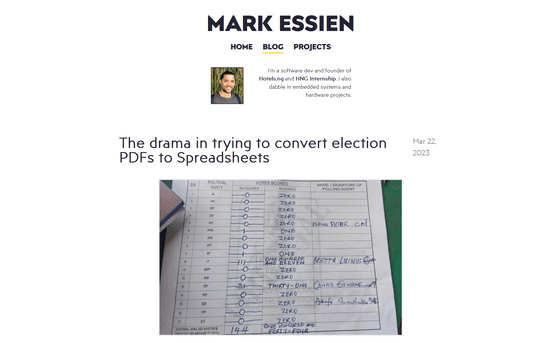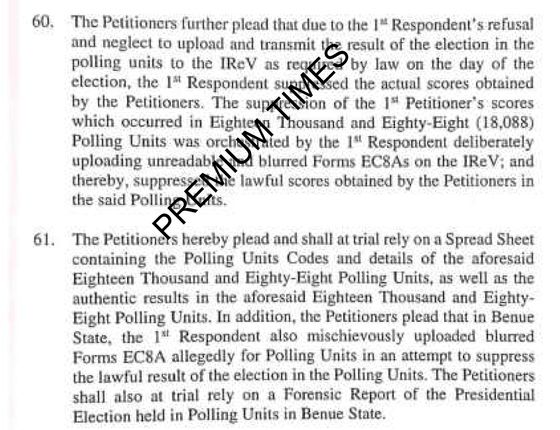The suspicion that the presidential election is fraudulent has emerged from the point that 'the number of votes does not match', and what is the effort of the software developer who stood up to investigate?

by
In the Nigerian presidential election held on February 25, 2023, Mr. Bora Tinub of the ruling All Progressive Congress (APC) was elected with 36.6% of the vote. However, against the background of intimidation and repression of voters during the election period and technical problems with the voting system, the Labor Party came in third after Atiku Abubakar of the People's Democratic Party (PDP). (LP)'s Peter Obi has filed a petition in court challenging the results.
Nigerian-born software developer Mark Essien, who helped Obi file the petition, has blogged about what happened during the election and how he was involved in the challenge. rice field.
The drama in trying to convert election PDFs to Spreadsheets - Mark Essien
https://markessien.com/posts/drama_of_transcription/

The Nigerian Election Commission has introduced a new biometric authentication system using fingerprints and face recognition for the 2023 presidential election, and has been proceeding with the election to realize the most transparent election ever. However, due to delays in opening polling stations, inadequacies in the voting system, and delays in the announcement of results, the elections
According to the Financial Times, there was a delay in Nigeria's first system of ``electronically transmitting the tally results from polling stations,'' and the results that were supposed to be disclosed in real time were only two days after the election. It was said that only about one-third was clear.
Even on Election Day, the opening of some of the approximately 177,000 polling stations across the country was delayed, forcing millions of voters to go home. There have also been reports of thugs breaking into and threatening polling stations, and armed men have been seen looting ballot boxes.

There were

Auditors set up by
Prior to this election, in 2022, one of Nigeria's candidates left the National Democratic Party on grounds of adverse proceedings for his nomination, becoming one of the first gubernatorial elections in Nigeria's history. Enter the Labor Party, a small party that has only won twice. This person is Mr. Obi, who came third in the election, and is the person in the midst of an objection to the election, which is full of allegations of fraud.
After Obi joined the Labor Party, a minority group that once stoked the public on social media and protested police brutality took notice of Obi.
This group devised the hashtag ' #EndSARS ' to protest the extrajudicial killings of the specially organized unit ' SARS ' in the Nigerian police, and developed it into a large-scale social movement. . Influenced by these activities, crowds called 'headless mobs' without leaders gathered in the thousands and attracted widespread attention, but after a shooting conflict with the Nigerian army in 2020 , things calmed down.

As the group began to broaden its activities again in 2022 and picked Mr. Obi as their preferred candidate, many of the social media users who participated in EndSARS now called themselves 'Obidient.' I started calling for support for Mr. Obi.
Mr. Obi himself seemed surprised that this group chose him, but he immediately accepted Obidient and began using the Obidient slogan as part of the election campaign.
While other politicians derided it as a “tweeting group in a room,” the movement grew larger on social media, with its members venting their anger at the existing political system. .
And on the day of the election, it becomes clear that tens of thousands and millions of votes were gathered for Mr. Obi, even though there was a problem with the aforementioned system. An obscure political party that had never produced a governor or a senator monopolized seats across much of the country.
Videos and photos of people chanting their victory were circulating on social media even before the results were known. But there were also disturbing things, including videos of polling stations being vandalized and people revealing they were threatened to hurt Labor voters.
After counting over multiple days, the actual number of votes released is as described above. Obi won the capital Abuja and the largest city Lagos, but lost the election. However, from this time on, a voice suddenly began to spread on social media, saying, ``If you manually total the tally papers announced by the Election Commission, the announced number of votes does not match.'' Eschen and others stood up to verify these suspicions.
Obio Akpọ, Rivers State
—Èyeñ Akwà Ibóm (@harold_202) March 5, 2023
INEC RESULT PORTAL:
LP=70,186
APC =12,547
INEC MANUALLY COLLATED RESULTS:
LP=3,829
APC=80,239
Peter Gregory Obi is winning this battle.pic.twitter.com/SoUsaqXj7t
Nigeria's electoral rules allow political parties to lodge objections within 21 days of the announcement of election results. But the allegation needed proof. The only evidence of what really happened in the election was a photograph of a tally of votes from more than 170,000 polling stations.

So, various Obidient groups were set up to think about how to extract data from photos within 21 days. Mr. Eschen himself is one of them, and he begins to explore ways to accurately obtain information from just photographs.
Mr. Essien tried reading with
As a result of consulting with collaborators, Mr. Eschen devises a means of `` having Obidients manually input ''. For this purpose, Mr. Eschen quickly built a website that was a simple site that displayed a picture of the ballot and asked the text field to transcribe the content of the vote.

Essien tweeted the link, and within minutes, the Obidients jumped on it, slowly at first, then rapidly, from one per minute to one every ten seconds, then one second. Input is now done at one page.
Obidient progressed the tally at the speed of entering 20,000 sheets per day, and it turned out that Mr. Obi was clearly leading by the time he counted 6 million votes. When the input continued and reached 10 million votes, which is 50%, it became clear that Mr. Obi was leading strongly.
After transcribing 14,000 polling units, this is the score based on the polling unit results on INEC website.
https://t.co/DombV8DUyE pic.twitter.com/OeVE9EMtYX — me (@markessien) March 7, 2023
Help us transcribe on
However, as a result of Mr. Essien's tweet of that information, he fell into chaos. Suddenly, out of nowhere, thousands of Twitter spam accounts began to hamper Essien's efforts. Threats and attacks of all sorts hit the Eschens, and thousands of bots accessed the site, all of which began entering huge numbers in favor of the ruling party, the elected Tinub. It developed into a situation where a large number of fake numbers were entered from different IP addresses and different proxies.
Therefore, Mr. Eschen and others immediately introduced a CAPTCHA of 'I am not a robot' to slow down the input speed of the bot a little. In addition, we introduced a check function that ignores the input of someone who enters a strangely large number. We intentionally displayed the results that have already been confirmed, and took measures such as rejecting the results if the wrong number was entered.
However, the people behind the bot continue to adapt and counteract what Mr. Eschen is doing. You'll stop entering ridiculously large numbers, start entering plausible numbers, and recruit hundreds of people to enter false information.

With the cooperation of many Obidients, Eschen and others managed to avoid these techniques. However, the opposition will start a new campaign, whether they have decided that they cannot win with technology. Around this time, hundreds of accounts claiming to be members of Obidient appeared, saying, ``We are working for the ruling party,'' and ``The work we are doing is to prove that Obidient has lost the election. started spreading propaganda such as
In addition, fake screenshots showing the ruling party winning were circulated, tweeted by incumbent government ministers, and featured in lantern articles by major local newspapers. The success of this technique made Obidients skeptical, and it seems that a prominent Obidient account even launched a thread asking, 'Is Mr. Essien actually working for the government?'
By this time, Mr. Eschen and others had completed the transcription of 150,000 ballots and moved to the verification phase to correct all the damage caused by the bot. However, lobbying by the opposition has had an impact, and there are no people to help with the verification. It managed to get started, but it was very slow, with less than 2000 entries validated per day. As it was, it was expected that it would take three months to complete.
At that time, Mr. Eschen discovers a small bug on his website. The bug is that the system that ``displays random photos whenever someone opens a website for the first time'' did not work as expected. The system tended to show photos that already had hundreds of inputs first, and then started showing them randomly.
In addition, it turns out that such a bug was successfully engaged in the opposition's sabotage activities. According to Eschen, many of the opponents tended to update the page each time they entered information, perhaps to prevent discovery. As a result, false information by opponents was already aggregated in photos with many inputs, and Mr. Eschen and others were able to narrow down the verification target to only those photos.
As a result of these rapid efforts, we succeeded in tallying a total of over 170,000 ballots in just five days. Essien shared the results with the team and provided them to Obi as part of the petition's documentation.

According to Middle East news outlet Al Jazeera , legal challenges to Nigerian elections are common, but the Supreme Court has never overturned a presidential election. Elected Mr. Tinub will be inaugurated as president from May 29, 2023 unless the court accepts the petition. 'We just have to wait and see what the referee decides,' said Eschen.
Eschen also publishes a spreadsheet that summarizes the results.
Nigeria Presidential Election 2023 Electoral Sheets Collation
https://drive.google.com/drive/folders/173oHgms6wYy5WKz_i3Lhl5mXcmobCHz?usp=sharing
Related Posts:
in Posted by log1p_kr







